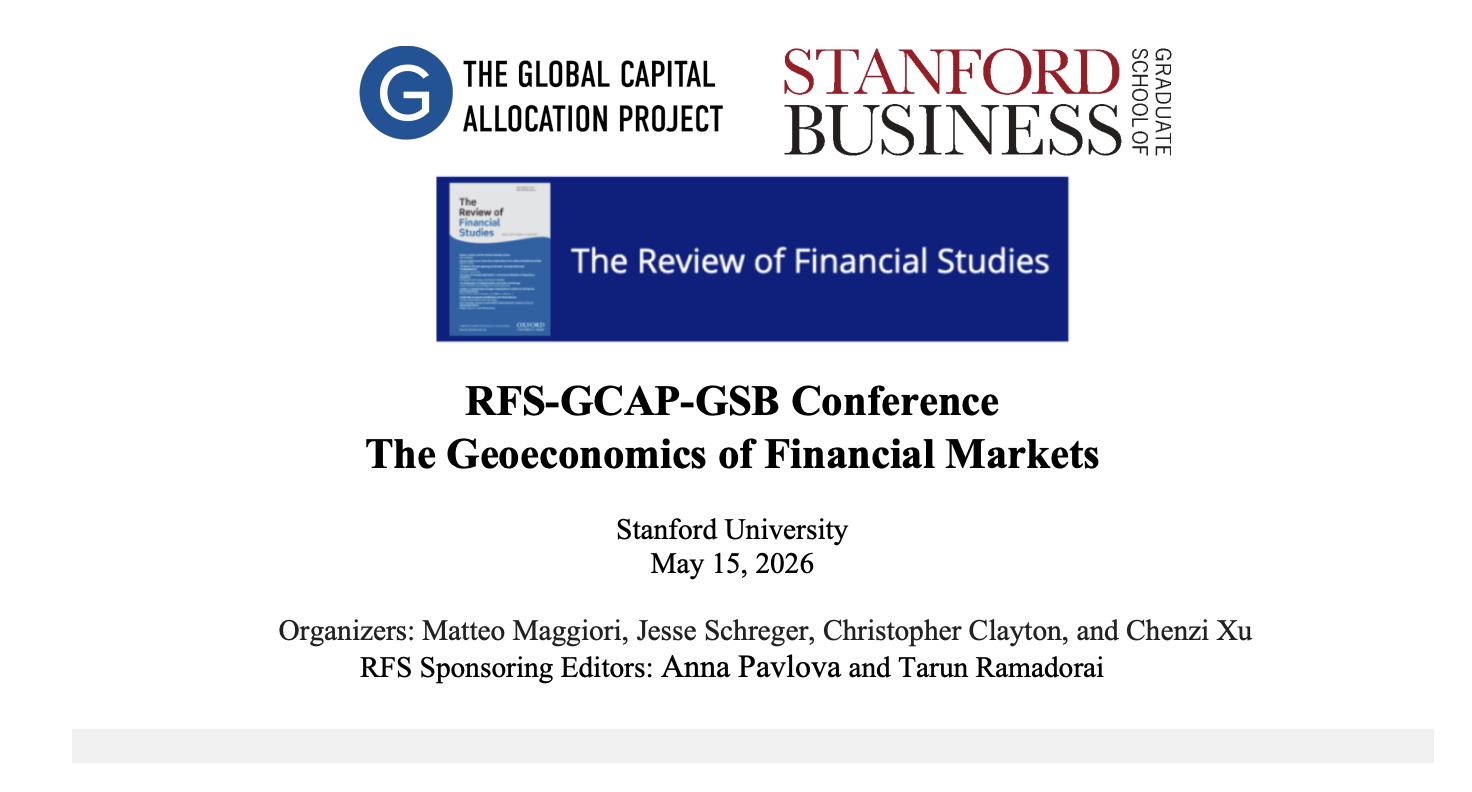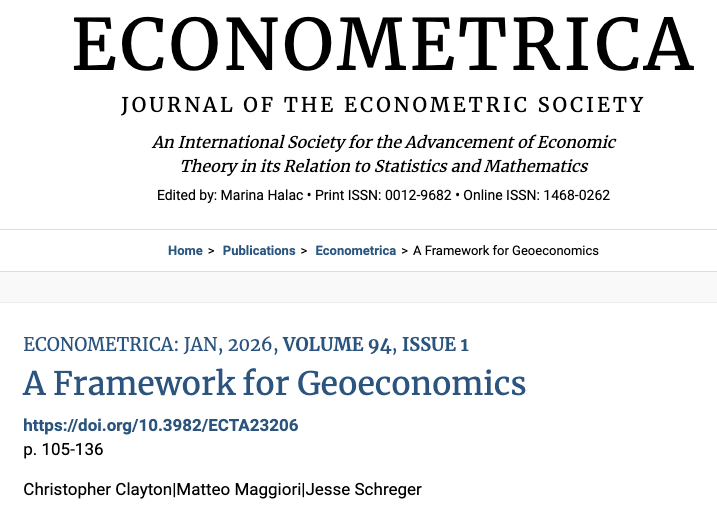The agenda for the the RFS-GCAP-BGS Conference is now available. It can be viewed here or on the event website.
Read MoreOur paper “A Framework for Geoeconomics” by Christopher Clayton, Matteo Maggiori, and Jesse Schreger has been published in the Econometrica, Volume 94, 2026.
Read MoreThe agenda for the the JIE-GCAP-BGS Conference is now available. It can be viewed here or on the event website.
Read MoreWe are excited to release a public, research-ready dataset for macroeconomics and finance built from SEC Form N-PORT mutual fund filings. What’s inside: Complete holdings at the security level for U.S. mutual funds and ETFs each quarter.
Read MoreThe Global Capital Allocation Project, Stanford Business, Government, and Society Initiative, and the Review of Financial Studies will convene a research conference on the geoeconomics of financial markets at the Stanford GSB on May 15, 2026.
More details here: https://www.globalcapitalallocation.com/geofinmkt.
Read MoreMatteo Maggiori gave a lunchtime plenary on Geoeconomics at The Econometric Society 2025 World Congress in Seoul. Slides from the session are available here.
Read MoreWe are organizing the third annual GCAP conference on international economics and finance, to take place in person at Columbia University in New York on October 17. For more information, see the call for papers.
Read MoreGCAP and the Stanford Business, Government, and Society Initiative will hold a JIE-GCAP-BGS Conference on Geoeconomics at Stanford GSB on February 27-28, 2026. See the call for papers.
Organized by Jesse Schreger (Columbia University), Jeff Frieden (Columbia University), Reka Juhasz (University of British Columbia), Carolin Pflueger (University of Chicago), and Christoph Trebesch (Kiel).
Read MoreNew paper on using Artificial Intelligence to measure the effect of tariffs, export controls, and sanctions on firms. Geoeconomic pressure—the use of existing economic relationships by governments to achieve geopolitical or economic ends—has become a prominent feature of global power dynamics. This paper introduces a methodology using large language models (LLMs) to systematically extract signals of geoeconomic pressure from large textual corpora. We analyze the ongoing trade war and update the draft at high frequency.
Visit our research page to learn more.
Read MoreWe have prepared a new paper for the 2025 AEA Papers and Proceedings, “The Political Economy of Geoeconomic Power.” Great powers are increasingly using their economic and financial strength for geopolitical aims. This rise of "geoeconomics" has the potential to reshape the international trade and financial system. This paper examines the role of domestic political economy forces in determining a government's ability to project geoeconomic power abroad. We also discuss the role that persuading or coercing foreign governments plays in projecting geoeconomic power around the world.
Visit our research page to learn more.
Read MoreOur paper “Internationalizing like China” is now forthcoming in the American Economic Review. We investigate the foreign holdings of Renminbi bonds and provide a theoretical framework to understand China's strategy to internationalize its currency. For more details, read the paper or a non-technical brief.
Selected media coverage: Bloomberg | The Economist | Business Insider | Bloomberg
Read MoreOur review article “Global Capital Allocation” by Sergio Florez-Orrego, Matteo Maggiori, Jesse Schreger, Ziwen Sun, and Serdil Tinda has been published in the Annual Review of Economics, Volume 16, 2024.
Read MoreOur paper “Corporate Debt Structure with Home and International Currency Bias” by Matteo Maggiori, Brent Neiman, and Jesse Schreger has been published in the IMF Economic Review, August 2024.
Read MoreThe agenda for the the 2nd Annual GCAP Conference is now available. It can be viewed here or on the GCAP conference event website.
Read MoreThe Banque de France and the Toulouse School of Economics (TSE) awarded the 2024 Junior Prize for Money and Macroeconomics to our Co-Director Matteo Maggiori in recognition of his work on capital flows, the determinants of international currencies and their role in financial integration.
To learn more, watch the full award ceremony or view the press release or detailed appendix.
Read MoreResearch presentations of “The Geography of Capital Allocation in the Euro Area” and “A Framework for Geoeconomics” have been posted to the GCAP YouTube channel. Subscribe to our channel to stay up to date on GCAP’s latest videos.
Read MoreOur collaborator Chris Clayton has won the 2024 Best Paper Award in Geoeconomics for junior researchers for “A Framework for Geoeconomics,” joint work with our Co-Directors Matteo Maggiori and Jesse Schreger. The prize was awarded jointly by Bocconi University, CEPR, and the Kiel Institute. Learn more about it here.
Read More

















